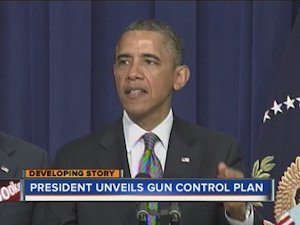5 Logical Fallacies from the Gun Debate
 | | "Another article about guns?! That makes me just wanna..." |
In 1764, before the United States was even a nation, four Lenape warriors entered a school in Pennsylvania, shot a schoolmaster, and killed nine children. Urged to do something as a result of this tragedy, the Pennsylvania Assembly reintroduced the scalp bounty system, in which the province would pay settlers to bring them the scalps of enemy American Indians. Thus began the long, long controversy over gun control laws in America. The debate has raged ever since, and everyone who engages in it is bound to come across well-worn arguments from all sides, most of which are completely and utterly fallacious.
Unless you've been a shut-in without access to the Internet, newspapers, or cable television for the last month or two, you are probably getting sick of hearing about gun control. I freely admit here and now that I am responsible for fanning the flames of this debate with my heavy libertarian inclinations and occasionally irrational defense of the United States Constitution. In the heat of argument, I committed my fair share of logical errors, some of which you will find below.
The following examples are specific, but it's easy to see how some popular arguments are inherently flawed. Some say a handful of school shootings is evidence that our culture and our legal system are broken somehow, even though there isn't enough data to make any meaningful statistical argument (a hasty generalization). Some argue that as soon as the federal government undertakes a handful of modest regulatory action to curb gun violence, it's only a matter of time before they're confiscating all our guns (a slippery slope). Some say that, if only we'd ban handguns or keep guns out of the hands of the mentally ill, there would be no more gun problem in America (the nirvana or perfect solution fallacy). Some like to paint a detailed picture of a certain violent event to appeal to your emotion and make you sound heartless if you don't want to do something about it (misleading vividness, among much else). Some like to say violent video games or a lack of prayer in school is the reason shooting sprees happen (the fallacy of the single cause). Even this very paragraph is made up of one straw man argument after another.
AD HOMINEM
 | | He wasn't talking about Fox News viewers, of course; we all know they're not racist |
During President Obama's second inauguration yesterday, Fox News anchor Shepard Smith engaged in a conversation about how popular support for gun control legislation is on the rise. In response to the suggestion that we should enact more gun control because of polling data (itself an argumentum ad populum), Smith said, "If we stuck with the polls...we'd have had slavery a lot longer than we did." [SOURCE]
This is an ad hominem attack on the American people, in addition to being a slight appeal to racism. An ad hominem argument is one in which the maker of an argument is attacked rather than the argument itself. In this case, Smith is saying that the American people are wrong to believe in more gun control because they supported slavery longer than it was legally sanctioned. An appeal to racism is a very specific type of ad hominem in which the arguer is accused of being a racist in order to discredit any argument he is making. In this case, Shepard Smith, by invoking slavery, is implying that popular American opinion is inherently racist, therefore anyone who agrees with the current popular opinion on gun control must also be racist.
POLITICIAN'S SYLLOGISM
 | | We can all rest easy, because he did something |
While unveiling his list of executive actions designed to tackle the perceived gun violence problem in America, President Obama said, "While there is no law or set of laws that can prevent every senseless act of violence completely--no piece of legislation that will prevent every tragedy, every act of evil--if there is even one thing we can do to reduce this violence--if there is even one life that can be saved--then we've got an obligation to try." [SOURCE]
The politician's syllogism is one of my favorite logical fallacies. It's a form of the fallacy of the undistributed middle which is best stated thusly: (a) Something must be done; (b) This is something; (c) This must be done. It is the bread and butter of political discourse throughout the world, and the president uses it here to justify his executive actions. He freely admits that he doesn't know whether or not the actions he is taking will cure the problem he is addressing, but he says that something must be done, so his executive actions are thus required. This is how many advocates for gun control like to frame the debate, because if something must be done, then they're the good guys for proposing something, even if its benefit is dubious.
APPEAL TO MOTIVE
 | | Maybe their hearts are just two sizes too small |
In that same speech, President Obama made the argument that "there will be pundits and politicians and special interest lobbyists publicly warning of a tyrannical, all-out assault on liberty--not because thatís true, but because they want to gin up fear or higher ratings or revenue for themselves. And behind the scenes, theyíll do everything they can to block any common-sense reform and make sure nothing changes whatsoever." [SOURCE] In response to this very statement, New York Post columnist Michael Goodwin wrote, "Gun control isnít really [President Obama's] aim. Itís just an excuse to get back into campaign mode and get out of Washington." [SOURCE]
The appeal to motive is a way of short circuiting an argument by claiming that it is only being made for personal gain on behalf of the arguer. Both President Obama and Michael Goodwin committed this fallacy. Obama does it by implicitly accusing anybody opposed to his agenda of being driven by profit motive rather than truth, and Goodwin does it by claiming that the president isn't interested in doing anything about gun violence, but is rather just promoting himself and shirking his other duties as president. This is fairly typical of both sides of the debate: some on the left accuse gun owners of being driven by paranoia or the manipulations of duplicitous and all-powerful lobbyists, while some on the right accuse gun control advocates of being driven by a nefarious desire to eliminate guns and control the American public.
FALSE CAUSALITY
 | | ...And Hannity was of course quick to point out the logical mistake |
Both sides of the debate like to throw around statistics as evidence for whatever point they're trying to make. Arkansas Representative Tom Cotton gave a good example of this when he said on Sean Hannity's television show, "The city of Chicago for instance has some of the most restrictive gun laws in the country. They also have some of the highest murder rates in the country." [SOURCE]
You commit a false causality--a cum hoc ergo propter hoc error--when you assume that correlation must equal causation. Here, Representative Cotton is making a point being made by a lot of people on the right, that places with more stringent gun control laws tend to have higher rates of gun violence, implying that gun control laws cause gun violence to go up. This is a fallacy because it ignores the possibility that the two things are influenced by a third factor, or that the high rate of gun violence caused the tougher gun laws to be enacted. This is a fallacy you should look for whenever statistics are being thrown around, because as one of my old dive instructors used to say, "Statistics are like bikinis: what they show is revealing, but what they hide is essential."
DENYING THE ANTECEDENT
 | | Nothing gets you excited about football like a halftime political rant |
Only a few days before the Sandy Hook Elementary School shooting propelled the gun debate to the front page of every newspaper in America, sports commentator Bob Costas made a splash by quoting a column about the recent murder/suicide of Jovan Belcher and his girlfriend, Kasandra Perkins. The specific quote, by columnist Jason Whitlock, is, "If [Jovan Belcher] didnít possess/own a gun, he and Kasandra Perkins would both be alive today." [SOURCE]
The only formal fallacy on this list, denying the antecedent occurs when you infer the inverse from an original statement. In other words, if A = B, it is fallacious to assume that Not A = Not B. A good example would be, "If you are an American citizen, you must be a human being. Therefore, if you are not an American citizen, you must not be a human being." Jason Whitlock is committing this fallacy because he is arguing thusly, "If Jovan Belcher had a gun, he must have used it to kill himself and his girlfriend. Therefore, if he didn't have a gun, he would not have killed himself and his girlfriend." He is ignoring the possibility that Jovan Belcher could have used another weapon (or even his bare hands) to commit his terrible act. This is a good example of the flawed hypotheticals being thrown around by both sides of the gun debate, whether it's a gun proponent arguing that there should have been armed security guards at Sandy Hook or it's the gun control advocate arguing that there should have been a limit on the number of rounds available in a gun's magazine. Not all hypothetical arguments are examples of denying the antecedent (or its counterpart, confirming the consequent), but almost all of them are logically dubious, just as almost every argument for or against gun control in America is mired in bad logic and poor reasoning.
-e. magill 1/22/2013
|
|